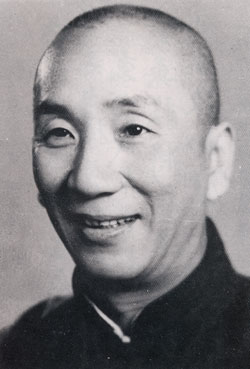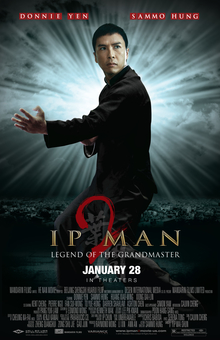From Wikipedia, the free encyclopedia
Yip Man (simplified Chinese: 叶问; traditional Chinese: 葉問; pinyin: yè wèn, Cantonese Jyutping: jip6 man6; Ip Man;[1] also known as 葉繼問 He was born on October 1, 1893 and died on December 2, 1972. Yip Kai Man was considered the first martial arts master (Chinese: Sifu) to teach the Chinese martial art of Wing Chun openly.[citation needed] He had several students who later became martial arts teachers in their own right, including Bruce Lee. He was born to Yip Oi Dor and Ng Shui, and was the third of four children. He grew up in a very wealthy family in Foshan, Guangdong, and received an exceptional traditional Chinese education. His older brother was Ip Kai Gak. His older sister was Ip Wan Mei and his younger sister was Ip Wan Hum.[2]
Biography
When Yip Man was thirteen years old he started learning Wing Chun from Chan Wah-shun (陳華順). Because of his sifu's old age, Yip Man had to learn much of his skills and techniques from his master's second eldest disciple Ng Chung-sok (吳仲素). Three years into Yip Man’s training Chan Wah-shun died. One of his dying wishes was to have Ng continue training Yip.
At the age of 15 Yip man moved to Hong Kong with help from Leung Fut Ting, a relative. At age sixteen, Yip Man attended school at St. Stephen's College in Hong Kong.[2] It was a secondary school for wealthy families and foreigners who lived in Hong Kong.
According to Yip Man's two sons,[2] while at St. Stephen's Yip Man intervened after seeing a foreign police officer beating a woman. The story goes that the Police officer tried to strike Yip Man who used his martial arts to strike the officer down, at which point Yip Man and his classmate ran to school. The classmate is said to have told an older man who lived in his apartment block. Yip Man was invited to see this man and the man asked Yip Man what martial art he studied. The man then asked Yip Man to show him his first 2 forms (Sil Lim Tao and Chun Kiu). The man then told Yip man that his forms were “not too great.” [2] Yip Man was then invited to Chi Sau (a form of training that involves controlled attack and defence), Yip Man saw this as an opportunity to prove his Kung Fu was good, but he was beaten after just a few strikes. It turned out that the old man was his master's elder fellow-disciple (and so, by Chinese tradition Yip Man's martial uncle), Leung Bik (梁璧), son of his master's master Leung Jan (梁贊). After that encounter, Yip Man continued his training lessons from Leung Bik. By the age of 24, Yip Man had returned to Foshan, his Wing Chun skills tremendously improved. [2]
In Foshan, Yip Man became a policeman.[2] He did not formally run a Wing Chun school, but taught several of his subordinates, his friends and relatives. Amongst those informal students, Lok Yiu, Chow Kwong-yue (周光裕 (六仔)), Kwok Fu (郭富), Lun Kai (倫佳), Chan Chi-sun (陳志新) and Lui Ying (呂應) were amongst the most well-known. Chow Kwong-yue was said to be the best student among his peers, but eventually he went into commerce and dropped out of martial arts all together.
Kwok Fu(郭富) and Lun Kai(倫佳) went on to teach students of their own. The art of Wing Chun in the Foshan and Guangdong area was mainly passed down from these two individuals. Chan Chi-sun(陳志新) died young, and Lui Ying(呂應) went to Hong Kong. Neither of them took any students.
Yip Man went to Kwok Fu's village house during the Japanese Occupation. He only returned to Foshan after the war, to once again take up the job of a police officer. At the end of 1949, the Chinese Communist party won the Chinese civil war. Yip Man being an officer of the opposing Kuomintang political party, decided to escape to Hong Kong without his family when the Communists had come to Foshan.
In Hong Kong, Yip Man opened a Wing Chun martial arts school. During the period of his youth in Foshan, it was not uncommon for young men from wealthy families to acquire the habit of smoking opium. Although it was illegal in Hong Kong, it was not difficult to obtain on the black market. Yip Man was known to be an opium addict[5]. The costs of opium were considered high at the time. Altogether, he needed a dependable source of income to support his habit and his family still living in Foshan.[6]
Initially, business was poor because his students typically stayed for only a couple of months. He moved his school twice, to Hoi Tan Street (海壇街) in Sham Shui Po, and then to Lee Tat Street (利 達街) in Yau Ma Tei. By then, some of his students were skilled enough that they were able to start their own schools.
Notable students of Yip Man include: Lun Gai, Gwok Fu, Leung Sheung 梁相, Lok Yiu 駱耀, Chu Shong-tin 徐尚田, Wong Shun Leung 黃淳樑, Wang Kiu 王喬, Yip Bo Ching, William Cheung, Hawkins Cheung, Bruce Lee, Lo Man Kam (Yip Man's nephew), Wong Long, Wong Chok, Law Bing, Lee Shing, Ho Kam-Ming, Moy Yat, Duncan Leung, Derek Fung (Fung Ping Bor), Chris Chan 陳成 (Chan Shing), Victor Kan, Stanley Chan, Chow Sze Chuen, Tam Lai, Ip Ching, Ip Chun, Lee Che Kong and Kang Sin Sin. Some of Yip Man's students and descendants compared their skills with other martial artists in combat. Their victories over other martial artists helped to bolster Ip Man's reputation as a teacher.
In 1967, Yip Man and some of his students established the Hong Kong Ving Tsun Athletic Association (香港詠春拳體育會).
In 1972, Yip Man suffered throat cancer and subsequently died on the 2nd of December that same year.[7]
Within the three decades of his career in Hong Kong, he established a training system for Wing Chun that eventually spread across the world.
Ip Man (film)
Ip Man (simplified Chinese: 叶问; traditional Chinese: 葉問; pinyin: Yè Wèn) is a 2008 semi-biographical martial arts film based on the life of Ip Man, a grandmaster of the martial art Wing Chun and the first person to teach the art openly. One of his students was the widely influential and acclaimed martial artist and filmmaker Bruce Lee. The film focuses on events in Ip's life that took place in the city of Foshan during the Second Sino-Japanese War. The film was directed by Wilson Yip, and stars Donnie Yen as Ip Man, with martial arts choreography by Sammo Hung. The supporting cast includes Simon Yam, Lynn Hung, Lam Ka-Tung, Xing Yu and Hiroyuki Ikeuchi.
The idea of an Ip Man biopic originated in 1998 when Jeffrey Lau and Corey Yuen discussed the idea of making a film based on Bruce Lee's martial arts master. However, the studio producing the proposed film closed, and the project was abandoned. Producer Raymond Wong decided to develop his own Ip Man film with full consent from Ip's sons, and had filmmakers head to Foshan to research Ip's life. Ip Chun, Ip Man's eldest son, along with martial arts master Leo Au Yeung and several other Wing Chun practitioners served as technical consultants for the film. Principal photography for Ip Man began in March 2008 and ended in August; filming took place in Shanghai, which was used to architecturally recreate Foshan. During filming, conflicts arose between the producers of Ip Man and filmmaker Wong Kar-wai over the film's working title. Wong, who had been developing his own Ip Man biopic, clashed with the producers after learning that their film would be titled Grandmaster Ip Man (traditional Chinese: 一代宗師葉問), which was too similar to the title of Wong's film. The producers of Ip Man agreed to change the film title, despite Wong's film being in development hell.
Ip Man premiered in Beijing on 10 December 2008, and was released theatrically in Hong Kong on 19 December 2008, receiving widespread acclaim from critics and audiences. Prior to the film's release, Raymond Wong announced that there would be a sequel; a second installment titled Ip Man 2, was released in April 2010. Ip Man grossed over US$21 million worldwide, despite not being released in North America and most of Europe. Following its success, the film was nominated for 12 Hong Kong Film Awards, winning awards for Best Film and Best Action Choreography.
| Directed by | Wilson Yip |
|---|---|
| Produced by | Raymond Wong |
| Written by | Edmond Wong |
| Starring | Donnie Yen Simon Yam Lynn Hung Hiroyuki Ikeuchi Lam Ka-Tung |
| Music by | Kenji Kawai |
| Cinematography | O Sing-Pui |
| Editing by | Cheung Ka-Fai |
| Running time | 108 min |
| Country | Hong Kong |
| Language | Cantonese Japanese Mandarin |
| Budget | US$11,715,578[1] |
| Gross revenue | US$21,888,598 |
| Followed by | Ip Man 2 (2010) |
Ip Man 2
Ip Man 2 (traditional Chinese: 葉問2:宗師傳奇; simplified Chinese: 叶问2:宗师传奇; ) is a 2010 semi-biographical martial arts film based on the life of Ip Man, a grandmaster of Wing Chun martial arts. A sequel to the 2008 film Ip Man, the film was directed by Wilson Yip, and stars Donnie Yen, who reprises the leading role. Continuing after the events of the earlier film, the sequel centers on Ip's movements in Hong Kong, which is under British colonial rule. He attempts to propagate his discipline of Wing Chun, but faces rivalry from other practitioners, including the local master of Hung Ga martial arts.
Producer Raymond Wong first announced a sequel before Ip Man's theatrical release in December 2008. Ip Man 2 was intended to focus on the relationship between Ip and his most famed disciple, Bruce Lee. The filmmakers, however, were unable to finalize film rights with Lee's descendants and decided to briefly portray Lee as a child. Principal photography for Ip Man 2 began in August 2009 and concluded in November; filming took place inside a studio located in Shanghai. For the sequel, Yip aimed to create a more dramatic martial arts film in terms of story and characterization; Wong's son, screenwriter Edmond Wong, wanted the film to portray how Chinese people were treated by the British, as well as the Western perceptions towards Chinese martial arts.
Ip Man 2 premiered in Beijing on 21 April 2010; the film was released in Hong Kong, as well as in other Asian territories on 29 April 2010.
| Directed by | Wilson Yip |
|---|---|
| Produced by | Raymond Wong |
| Written by | Edmond Wong |
| Starring | Donnie Yen Sammo Hung Lynn Hung Huang Xiaoming |
| Music by | Kenji Kawai |
| Cinematography | Poon Hang-Sang |
| Editing by | Cheung Ka-Fai |
| Running time | 109 minutes |
| Country | Hong Kong |
| Language | Cantonese Mandarin English |
| Budget | US$12,902,809[1] |
| Gross revenue | HK$36,975,610 (domestic)[2] |
| Preceded by | Ip Man (2008) |


